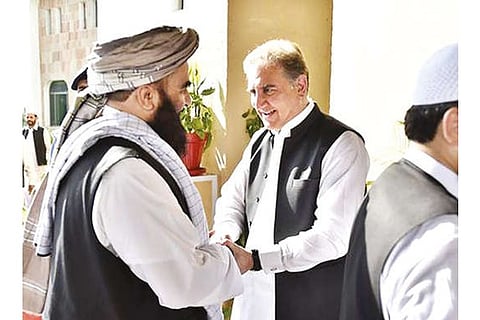

Kabul
The incident angered Pakistan, but Taliban spokesman Zabiullah Mujahid swiftly denied reports of emerging rifts between Afghanistan’s new rulers and Islamabad. But there are some other sore spots between the Taliban and Pakistan.
The Taliban’s refusal to recognise the Durand Line as a permanent border separating the Pashtun-majority areas of Pakistan and Afghanistan also raised eyebrows in Islamabad. A majority of Pashtuns — most Taliban leaders and fighters belong to the ethnic group — do not accept the 2,670-kilometre- (1,660-mile) long Durand Line as the international land border between the two countries.
The Durand Line was established by the British in 1893 and has remained a bone of contention between Afghanistan and Pakistan since the latter gained independence from British rule in 1947.
Taliban seeks legitimacy
Pakistan played an important role in facilitating the 2020 US-Taliban deal. It has also backed the Taliban regime since it regained power in Afghanistan on August 15. But Pakistan has not yet recognised the Taliban as Afghanistan’s legitimate rulers, possibly because of pressure from the United States.
Experts say that this could also be the reason behind the growing friction between Islamabad and the Taliban. On Wednesday, the Taliban urged the international community to recognise its government in Afghanistan at a summit in Moscow.
But there is still no guarantee that regional and international players will pay heed to the request. Islamabad has urged global leaders to recognise the Taliban regime, but these efforts suffered a major blow when the Taliban did not announce an inclusive interim government involving different stakeholders and ethnicities.
The group’s crackdown on protesters and curbs on human rights have also put Pakistani authorities in a tight spot when pleading Taliban’s case to the international community. In turn, the Taliban feel that Pakistan can do more to convince the world to accept their rule.
Pak ‘supporting Haqqanis’
Apart from these international affairs, there are some pressing domestic issues that are souring the ties between the Taliban and Pakistan. Analysts say that some veteran Taliban commanders are miffed that Islamabad is trying to keep the new Afghan regime under control through its backing of the Haqqani Network, which is part of the transitional government.
“In the 1990s [after the Soviet forces left Afghanistan], Pakistan backed Gulbuddin Hekmatyar, a warlord, to control Afghanistan. Now, Islamabad is supporting the Haqqanis, who have been given key ministries in the interim government,” Said Alam Mehsud, a Peshawar-based expert on Afghan and Pashtun affairs, told DW.
“This support, however, has angered some Taliban factions,” he said. A former Afghan official told DW on condition of anonymity that senior Taliban commander Mullah Abdul Salem Zaeef, acting Afghan Defense Minister Mullah Yaqoob and many other Taliban leaders are not pleased with Pakistan’s backing of members of the Haqqani Network. Reports about a tug-of-war among Taliban factions first appeared during the establishment of a caretaker setup in Afghanistan. The transitional setup suggested that Afghanistan’s new rulers were unable to unify their ranks.
Visit news.dtnext.in to explore our interactive epaper!
Download the DT Next app for more exciting features!
Click here for iOS
Click here for Android